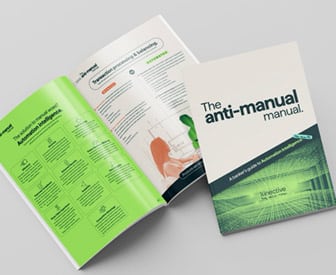On Main Streets and in strip malls across America, signs are taped on doors and windows: “Closed due to coronavirus”; or “Take-out only.”
Gyms, restaurants, barbershops, nail salons, non-food retailers, and countless other small businesses, including small contractors, have all been forced to close to support social distancing rules being implemented in numerous states and around the world. There are 30 million small businesses in the U.S. alone, according to the SBA. Even if just 10% of them were forced to halt operations due the pandemic, that’s three million businesses.
The impact on these small enterprises, the backbone of the U.S. economy, is devastating. Just as few consumers have deep savings to draw on, many small businesses will quickly burn through available cash and be unable to pay their rent or make their loan payments within a few weeks of shutting down due to the crisis. As in previous crises, financial institutions are at the epicenter. They had nothing to do with the cause, yet the potential for a credit crisis grows with each passing week of economic inactivity.
At the federal and state levels, policymakers are pulling all the levers to stave off an economic deep freeze. In addition to a massive federal financial aid package — which could include $350 billion in help for small business — the federal and state banking regulators, in a joint statement, urged financial institutions to work with customers impacted by the COVID-19 crisis. If done in a safe and sound manner, the statement said, the agencies “will not criticize institutions … and will not direct supervised institutions to automatically categorize loan modifications as troubled debt restructurings.”
The proposed federal aid package would distribute relief funds directly to individuals, but the government is counting on the banking community to help implement some of the relief measures for small businesses and supplement them with steps of their own. Much of the proposed $350 billion in funding for small-business interruption loans would be issued through the Small Business Administration’s 7(a) program, according to the Wall Street Journal. About 1,800 banks, credit unions and other financial institutions work with the SBA to issue these loans.

The unfair advantage for financial brands.
Offering aggressive financial marketing strategies custom-built for leaders looking to redefine industry norms and establish market dominance.

The Power of Localized Marketing in Financial Services
Learn how to enhance your brand’s local visibility, generate more leads, and attract more customers, all while adhering to industry regulations and compliance.
Read More about The Power of Localized Marketing in Financial Services
Offers of Fee Relief and Interest Deferrals
Increasing numbers of banks and credit unions are stepping up efforts to assist small business customers. More needs to be done quickly, however, before the damage becomes irreversible for many small enterprises.
What follows is a sampling of how financial institutions are helping small businesses. Many of the press reports and website statements describing these actions give few details. However, measures like these, announced March 21 by Associated Bank, Green Bay, Wis., are being seen at a number of large and small institutions around the country:
- Loan Payment Deferral. If your small business is facing a financial hardship due to COVID-19, contact Associated Bank. We will make available payment deferrals for up to 90 days, with no credit bureau impact.
- Small Business Credit Card Relief. We will provide temporary payment relief assistance, including fee waivers and preventing the assessment of late or over limit fees.
- Late Fee Suspension. We will suspend late fees on small business loan payments in April 2020, providing customers the opportunity to adjust to workplace changes.
In addition to remedies similar to those above, Bank of America is allowing small business clients to request refunds on various fees including overdraft, late fees and monthly maintenance fees. The giant bank, like many institutions, notes on its website that it works on a case by case basis for these requests, as it has in other situations such as the government shutdown in early 2019 and during natural disasters. The scope of the COVID-19 crisis, however, could strain such a plan, especially for the larger institutions with millions of small business customers.
ABN AMRO took a different approach. The big Dutch bank announced that for 55,000 business clients with a credit facility of up to 2.5 million euros ($2.68 million), “payment of interest and principal will be automatically deferred for six months. Interest and principal payments due in April through September will not be collected from these clients; they can make these payments later.” For business clients with larger credit facilities, the bank reverts to a case-by-case basis.
A much smaller institution, OceanFirst Bank, operating in Pennsylvania and New Jersey, has a blanket program specifically targeting two types of retail small businesses. On its website, the bank states:
“Public accommodation businesses, such as restaurants/caterers, and certain retail establishments, that are forced to close will be eligible for full deferral of loan payments (principal and interest) for 90 days, and immediate working capital facilities up to $200,000.” Further, such businesses that are reducing services (such as transitioning to take-out only) “will be eligible to make interest-only payments and defer principal payments for 90 days, and immediate working capital facilities up to $100,000.”
Some financial institutions are addressing cash-flow squeezes directly, by amending certain policies. Vermont’s NBT Bank, for example, has increased daily limits on mobile deposits and is temporarily waiving penalties for early CD withdrawals up to $20,000 for small business customers.
Many institutions are promising to help customers obtain an SBA 7(a) loan. Pennsylvania-based Customers Bank, for example, is notifying small business clients of SBA’s emergency loan program as well as traditional SBA financing options. “We want businesses throughout the community to know we are available to help them navigate the complexities of the SBA loan process,” states Richard Ehst, President and CEO. Ehst also said the bank has committed to provide $200 million in new small business lending to qualifying companies.
In Australia, banks have pulled together collectively to assist the small business community. The Australian Banking Association announced a plan in which its members will give small businesses a six-month break on making payments on loans, according to The Guardian. Association Chief Executive Anna Bligh says the plan covers $100 billion in loans and will free up about $8 billion in funds for the covered businesses.
Less Activity in New Lending
New loan initiatives that go beyond helping small businesses obtain SBA loans are less in evidence so far among the banks and credit unions scanned by The Financial Brand.
Reduced-interest loans have cropped up on some websites. U.S. Bank is one example, offering loans at rates up to 2% lower than standard on its Quick Loan general purpose business loans (up to $250,000) and its Cash Flow Manager business line of credit.
Another example is Seattle-based WaFd Bank (Washington Federal Bank, NA), which announced a revolving 5-year business line of credit up to $200,000 with the first 90 days interest free available to businesses impacted by COVID-19. Describing the line as “emergency funding,” the bank says any company with a 10% or greater drop in revenue can apply. It also says it will expedite the approval process for lines up to $30,000.
“We understand that small businesses may need an emergency business loan due to the Coronavirus (COVID-19) outbreak and we are doing our best to help out small businesses during this uncertain time,” the bank says on its website.

Big Techs Are Actively Engaged
A timely response by traditional financial institutions is not only critically important to their small business customers, it carries competitive significance for when conditions return to normal. Big tech online lenders, with their ability to respond quickly, could gain a leg up with business customers they had not worked with before.
Financial Innovation Now, an organization representing Amazon, Apple, Google, Intuit, PayPal, Square and Stripe wrote to Congress explaining why such fintech giants can provide quick distribution of federal aid to small businesses, according to the Become site.
In addition, Facebook has offered $100 million in cash grants and ad credits to restaurants and other small businesses. Facebook said the grants will be available for up to 30,000 small businesses in over 30 countries. “That would be an average of $3,333 per business,” CNBC noted.







